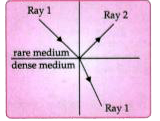Complete Solutions to SECTION-I of chapter SAMPLE PAPER 2012 of Class 10 book with complete answers and questions
| Class 10 | PHYSICS |
| Chapter | SAMPLE PAPER 2012 |
| GURUKUL | SECTION-I |
| Number Of Questions | 33 |
| Academic Year | 2023-24 |
Define 1 kgf.
View SolutionHow is it related to the S.I. unit of force ?
View SolutionWhat are non-contact forces ?
View SolutionHow does the distance of separation between two bodies affect the magnitude of the non-contact force between them ?
View SolutionA boy of mass 30 kg is sitting at a distance of 2 m from the middle of a see-saw. Where should a boy of mass 40 kg sit so as to balance the see-saw ?
View SolutionWhat is meant by the term 'moment of force' ?
View SolutionIf the moment of force is assigned a negative sign then will the turning tendency of the force be clockwise or anti-clockwise ?
View SolutionA ball is placed on a compressed spring. When the spring is released, the ball is observed to fly away.

What form of energy does the compressed spring possess ?
View SolutionA ball is placed on a compressed spring. When the spring is released, the ball is observed to fly away.

Why does the ball fly away?
View SolutionState the energy conversion taking place in a solar cell.
View SolutionWhat is a solar cell? State two uses of solar cells. State whether solar cell produces a.c. or d.c. Give one disadvantage of using a solar cell.
View SolutionA body of mass 0.2 kg falls from a height of 10 m to a height of 6 m above the ground. Find the loss in potential energy taking place in the body.
`[g=10ms^(-2)]`
View SolutionDefine the term refractive index of a medium in terms of velocity of light.
View SolutionA ray of light moves from a rare medium to a dense medium as shown in the diagram below. Write down the number of the ray which represents the partially reflected ray.

View SolutionYou are provided with a printed piece of paper. Using this paper how will you differentiate between a convex lens and a concave lens ?
View SolutionA ray of light incident at an angle of incidence 'I' passes through an equilateral glass prism such that the refracted ray inside the prism is parallel to its base and emerges from the prism at an angle of emergence 'e'.
How is the angle of emergence 'e' related to the angle of incidence 'i' ?
View SolutionA ray of light incident at an angle of incidence 'I' passes through an equilateral glass prism such that the refracted ray inside the prism is parallel to its base and emerges from the prism at an angle of emergence 'e'.
What can you say about the value of the angle of deviation in such a situation ?
View SolutionWhat do you mean by dispersion of light?
View SolutionIn the atmosphere which colour of light gets scattered the least ?
View SolutionWhich characteristics of sound will change if there is a change in
its amplitude
View SolutionWhich characteristics of sound will change if there is a change in
its waveform.
View SolutionName one factor which affects the frequency of sound emitted due to vibrations in an air column.
View SolutionName the unit used for measuring the sound level.
View SolutionAn electrical appliance is rated at 1000 KVA, 220 V. If the appliance is operated for 2 hours, calculate the energy consumed by the appliance in :
kWh
View SolutionAn electrical appliance is rated at 1000 KVA, 220 V. If the appliance is operated for 2 hours, calculate the energy consumed by the appliance in :
joule
View SolutionCalculate the equivalent resistance between P and Q from the following diagram:

View SolutionWhat is an a.c. generator or Dynamo used for ?
View SolutionName the principle on which it works.
View SolutionDifferentiate between heat capacity and specific heat capacity.
View SolutionA hot solid of mass 60 g at `100^(@)C` is placed in 150 g of water at `20^(@)C`. The final steady temperature recorded is `25^(@)C`. Calculate the specific heat capacity of the solid. [Specific heat capacity of water = 4200 `kg^(-1)""^(@)C^(-1)`]
View SolutionWhat is the value of the speed of gamma radiations in air or vacuum ?
View SolutionName a material which exhibits fluorescence when cathode rays fall on it.
View SolutionGive any two important sources of background radiation.
View Solution
SECTION-I questions and complete solutions for chapter SAMPLE PAPER 2012 of SELINA PHYSICS (ENGLISH) of Class 10